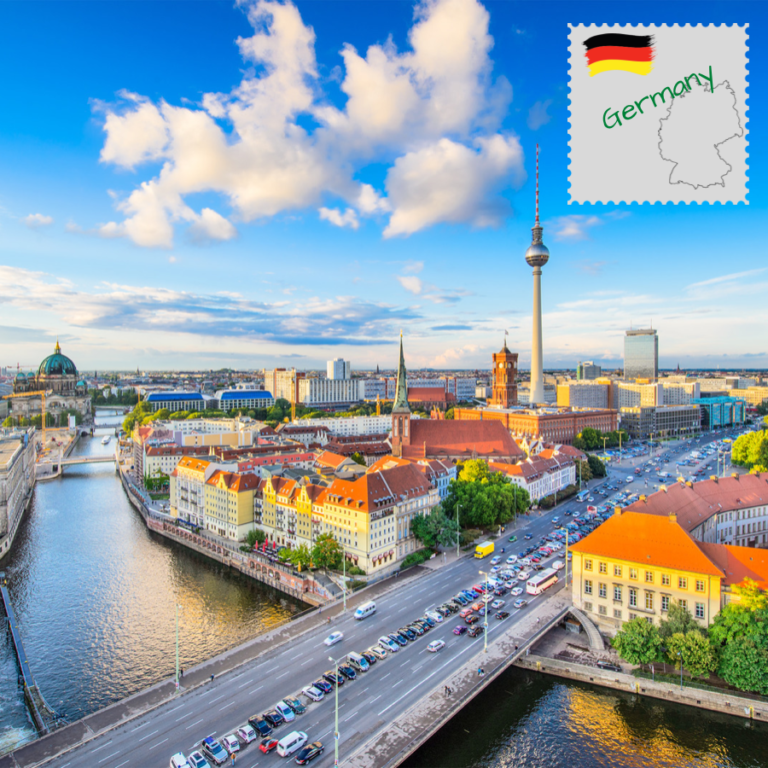
A stop during a road trip from the Netherlands to Denmark took me through a small portion of Germany. I saw very little of the landscape and even less of the history that, perhaps, plagues the country. My interest in Germany is for its abundance of attractions for the dark tourist. Dark tourism has been defined as tourism involving travel to places historically associated with death and tragedy. More recently, it was suggested that the concept should also include reasons tourists visit that site, since the site’s attributes alone may not make a visitor a “dark tourist.” Landlocked, except for stretches of coast along the North and Baltic Seas, Germany has borders with 9 European countries. Situated at the crossroads of Europe, the country has been a power since the 8th-century, but Germany remained a patchwork of rival kingdoms until the late 19th-century when it united as one country. The price of nationalism was high. At the end of World War II, Germany lay in ruins, divided between the East and the West. It was split into two countries until the collapse of communism made reunification possible.


German is, of course, the official language. English is the most common foreign language spoken among Germans, followed by French and Spanish. But Germany is a country of immigration, and immigrants obviously bring with them their native languages as well as their cultures. So in the cities, you will hear lots of other languages, especially Turkish and Italian

The unit of currency in Germany is the euro (€). Euros come in seven notes (€5, €10, €20, €50, €100, €200 and €500) and eight coins (€0.01, €0.02, €0.05, €0.10, €0.20, €0.50, €1 and €2). Cash is king in Germany. Always carry some with you, and plan to pay cash almost everywhere. It’s also a good idea to set aside a small number of euros as an emergency stash.

Germany is a party to the Schengen Agreement. U.S. citizens may enter Germany for up to 90 days for tourist or business purposes without a visa. Your passport must be valid for at least three months beyond your period of stay.

Germany is a Go Roam in Europe destination which means you can use your data here at no extra cost. If you have an Add-on with a data allowance of 20GB or greater, a fair use limit applies, with use over 20GB subject to a small surcharge. There are currently locations all over Germany with Wi-Fi hotspots (free or for a fee). According to one website, there are over 500 free Wi-Fi locations in Berlin alone, mostly at cafes, restaurants, and hotels. The most common commercial Wi-Fi service in Germany is the Telekom HotSpot Network.

Hotels €1 per bag is standard. It’s nice to leave a little cash for the room cleaners (€1 or €2 per day). Restaurants Bills always include Bedienung (service charge); most people add 5% or 10% unless service was truly abhorrent. Bars About 5%, rounded to nearest euro. For drinks brought to your table, tip as for restaurants. Taxis Tip about 10%, rounded to the nearest euro. Toilet attendants will typically receive loose change.

ATMs widely available in cities and towns, rarely in villages. Credit cards are not widely accepted. ATMs are plentiful in towns and cities and usually accessible 24/7.

You need a power plug adapter in Germany when living in the United States of America. You also need a voltage converter. Be extra careful with certain appliances because of the difference in frequency. In Germany, the power plugs and sockets are of type F. Check out the following pictures. When living in the United States of America you need a power plug adapter for sockets type F.

In Germany, the “tourist season” runs roughly from May through September. Summer has its advantages: the best weather, snow-free alpine trails, very long days (light until after 9:00 pm), and the busiest schedule of tourist fun. Travel during “shoulder season” (spring and fall) is easier and can be a bit less expensive.
There are many options for getting around Puerto Rico. With numerous flights connecting various airports around the island, including Culebra and Vieques; a ferry service from San Juan to various nearby destinations, including from Fajardo to Vieques and Culebra; to the train, bus, taxis, and públicos, you won’t have any problem reaching your destination or going out and exploring all that Puerto Rico has to offer.
Taxis are expensive and, given the excellent public transport systems, not recommended unless you’re in a real hurry. (They can actually be slower than trains or trams if you’re stuck in traffic.) Cabs are metered and charged at a base rate (flagfall) plus a per-kilometre fee. These charges are fixed but vary from city to city. Some drivers charge extra for bulky luggage or night-time rides. It’s rarely possible to flag down a taxi; more typical is to order one by phone (look up Taxiruf in the phone book) or board at a taxi rank. If you’re at a hotel or restaurant, ask staff to call one for you. Taxis also often wait outside theatres or performance venues. Smartphone owners can order a taxi via the Mytaxi app (downloadable for free via iTunes or Google Play) in more than 30 German cities.
Cycling is allowed on all roads and highways but not on the autobahns (motorways). Cyclists must follow the same rules of the road as cars and motorcycles. Helmets are not compulsory (not even for children), but wearing one is common sense. Dedicated bike lanes are common in bigger cities.
Cheaper and slower than trains and with a growing long-haul network. Regional bus services fill the gaps in areas not served by rail.
Only useful for longer distances, eg Hamburg to Munich or Berlin to Munich. Most large and many smaller German cities have their own airports, and numerous carriers operate domestic flights within Germany. Unless you’re flying from one end of the country to the other, say Berlin to Munich or Hamburg to Munich, planes are only marginally quicker than trains once you factor in the time it takes to get to and from airports.
To rent a car in Germany, you need a valid driver’s license from your home state or province. Visitors may also consider getting an International Driving Permit which is only about $15 and accepted in many places around the world.
Extensive network of long-distance and regional trains with frequent departures; fairly expensive but numerous deals available. Germany’s rail system is operated almost entirely by Deutsche Bahn, with a variety of train types serving just about every corner of the country. The DB website has detailed information (in English and other languages), as well as a ticket-purchasing function with detailed instructions.
Considering that Germany abuts two seas and has a lake- and river-filled interior, don’t be surprised to find yourself in a boat at some point. For basic transport, ferry boats are primarily used when traveling to or between the East Frisian Islands in Lower Saxony; the North Frisian Islands in Schleswig-Holstein; Helgoland, which also belongs to Schleswig-Holstein; and the islands of Poel, Rügen, and Hiddensee in Mecklenburg–Western Pomerania. The Romanshorn–Friedrichshafen car ferry provides the quickest way across Lake Constance between Switzerland and Germany. It’s operated year-round by Schweizerische Bodensee Schifffahrt and takes 40 minutes.
The cuisine of Germany is made up of many different local or regional cuisines, as is typical for somewhat larger countries. Germany itself is part of a larger cultural region, Central Europe, sharing many traditions with neighboring countries such as Poland and the Czech Republic. Southern regions, like Bavaria and Swabia, share dishes with Austrian and parts of Swiss cuisine. German food is rich, hearty, and diverse. It’s comfortable eating with high-quality, often locally sourced ingredients. The cuisine of Germany has been shaped not only by the country’s agricultural traditions but by the many immigrants that have made the country home over the centuries. It’s definitely more than a mere mix of beer, sauerkraut, and sausage.
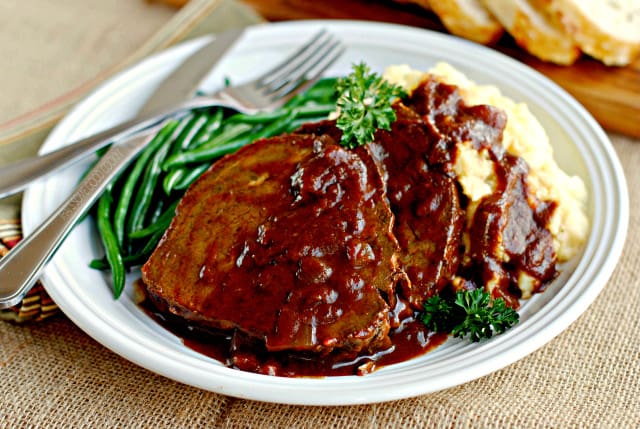
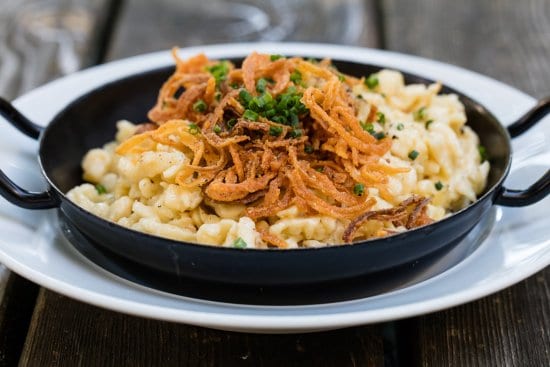
Visitors to German-speaking Europe have a wide choice of overnight accommodations ranging from four-star luxury to economical hostels (Herbergen) or Zimmer (private rooms for rent, B&Bs). Whether you choose a ritzy four-star hotel or a modest hostel, you’ll enjoy clean, modern lodgings at a fair price. The only difference is the degree of luxury or economy you prefer. Even many small towns in Germany offer clean, quality accommodations in small hotels, B&Bs, or pensions.
Germans take pride in having neat and clean places for visitors to stay. Another advantage of small-town lodgings is lower prices. You will find many familiar hotel brands all across German-speaking Europe, as well as a few less familiar international brands. While Best Western, Hilton, Holiday Inn, Hyatt, InterContinental/Crowne Plaza, Marriott, Radisson, Sheraton/Westin, Wyndham/Ramada, and others may ring a bell, you will also find other respected international brands, including ibis, Kempinski, NH, and Steigenberger, that are less familiar. All of Germany’s principal commercial airports have airport hotels, and these can be convenient for travelers flying to or from Germany. The on-site hotels tend to be pricey but very convenient. Airbnb and other short-term rental outfits offer apartments and even houses for rent in Germany and other European countries.
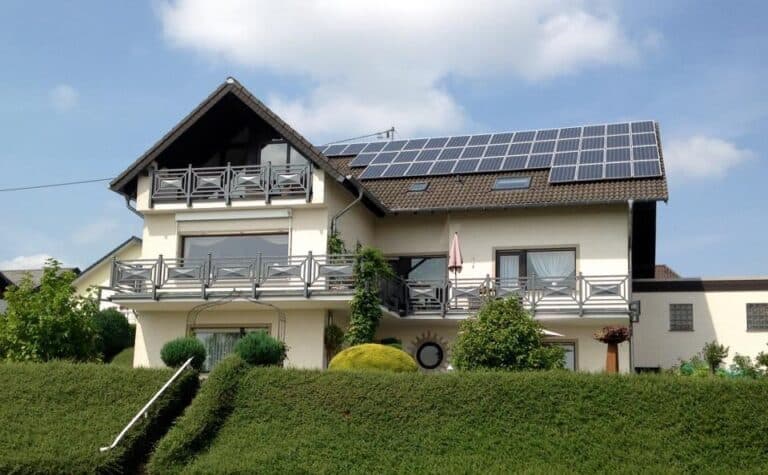

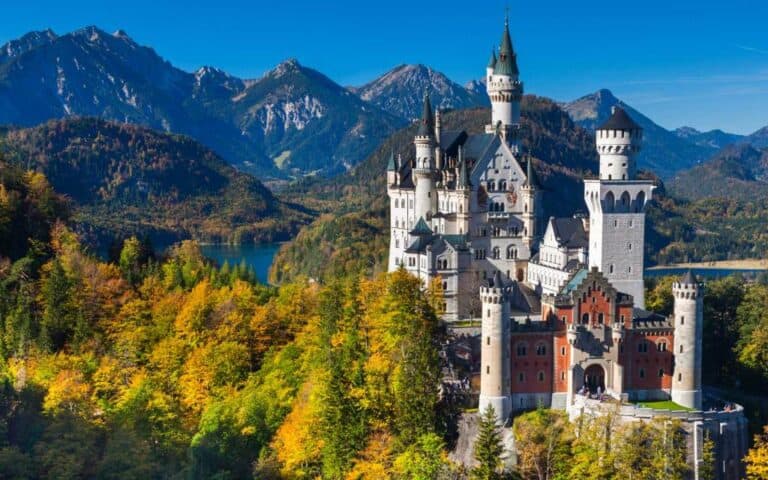
Neuschwanstein Castle, in Germany, is one of the greatest castles in Europe – and one of the world’s foremost tourist attractions. Part theatre, part fairytale, Neuschwanstein Castle embodies the soul of King Ludwig II of Bavaria, popularly known as ‘mad King Ludwig’.

The Bavarian Forest National Park is a national park in the Eastern Bavarian Forest immediately on Germany’s border with the Czech Republic. It was founded on 7 October 1970 as the first national park in Germany. Since its expansion on 1 August 1997, it has covered an area of 24,250 hectares.
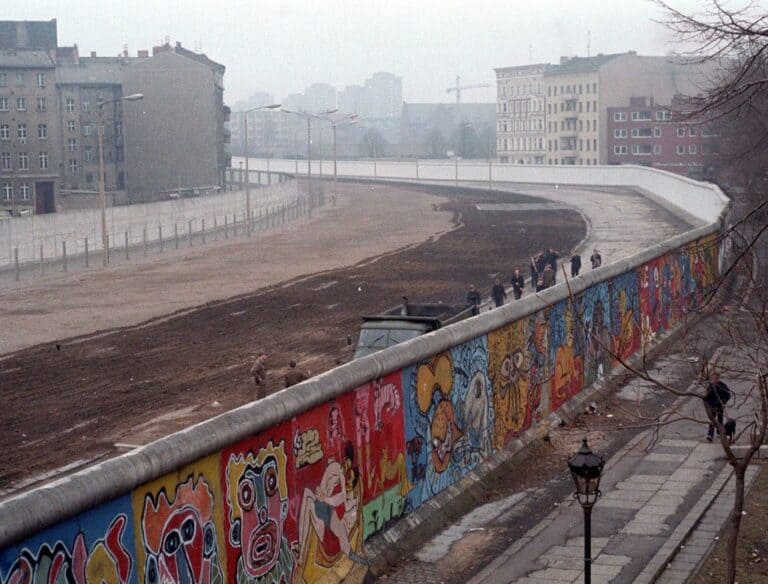
The Berlin Wall was a guarded concrete barrier that physically and ideologically divided Berlin from 1961 to 1989. Construction of the wall was commenced by the German Democratic Republic on 13 August 1961. The Wall cut off West Berlin from surrounding East Germany, including East Berlin.

A memorial to the bombing of Hamburg in WWII: the main part is the ruins of the neo-Gothic Nikolaikirche church proper, of which little more than the church tower is still standing, which is, however, still a prime landmark of Hamburg’s skyline. Its dark, sooty silhouette now serves as a reminder of not only the building’s but also the city’s, destruction in the first Allied bombing raids aimed at major cities in July 1943 (named “Operation Gomorrah”). Tens of thousands of civilians perished in the firestorm brought about by a shower of explosive and incendiary bombs – and about half of the city’s buildings were destroyed or badly damaged. The church ruin today serves as a reminder of this darkest chapter in Hamburg’s history, and as a memorial is supplemented by a small museum, which has recently been upgraded and expanded.
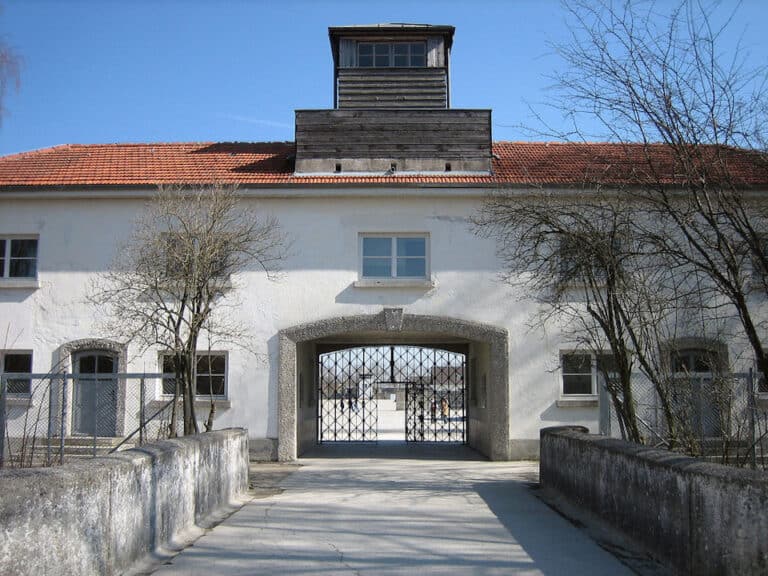
Dachau concentration camp was set up only weeks after Hitler and the Nazi party came into power in Germany in early 1933. Its initial primary function was to intern political opponents in an effort to consolidate the Nazis’ grip on power. The site, near Munich, of the first (and longest-running) of the concentration camps set up in the Nazis’ Third Reich. Thus the name is almost synonymous with the whole concept of the concentration camp system. It is today one of the most visited dark tourism sites in Germany (and even worldwide).
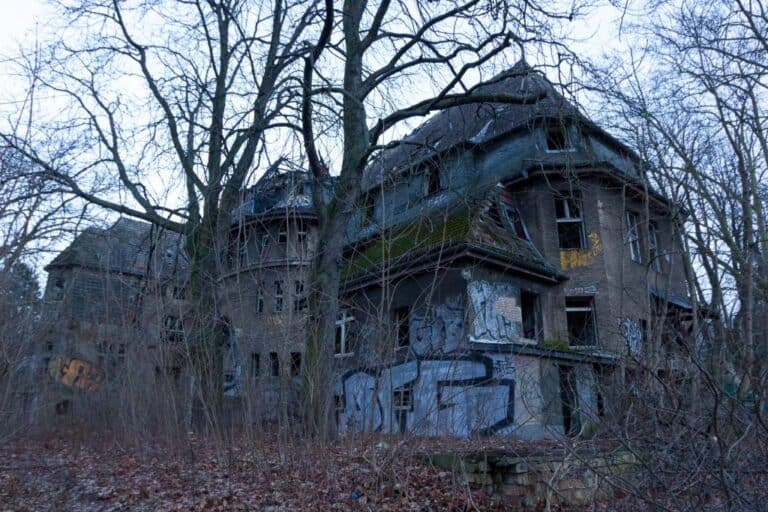
A state-of-the-art medical facility from the Imperial era is now a derelict ruin. An empty, tumble-down, sprawling complex sits amidst handsome new apartment buildings in Berlin’s Weissensee neighborhood. Though an intrigued passerby probably wouldn’t guess it, this crumbling graffiti gallery was once a cutting-edge pediatric medical facility, abruptly banished almost 20 years ago to a bizarre limbo that continues to this day.
Accommodation:
Hotel or Hostel (single): $27
Double-occupancy room: $54
Food
Meals for one day: $13
Coffee: $2.92
Coffee at Impala: $9.50
Leberkässemmeln (Veal & Pork Sandwich): $2.37
Restaurant dinner and beers for 2: $73
Currywurst: $2.43
2 Pho Noodles: $11
Turkish sandwich: $2.43
Sausage at Butcher: $5.22
Transportation
Taxis, local buses, train: $7.83
Intercity: $23
City transport day-ticket: $13
Single zone trip on the subway: $2.80
Inner district subway day-pass: $6.33
Short taxi ride: $24
Bahn ticket: $3.65
Short trip metro ticket: $1.70
Short distance Ubahn ticket: $2.07
Car rental: $61
Bayern day-pass for 2: $33
Bus to city center: $6.09
Entertainment
Entrance tickets & shows: $8.32
Mauer Park for 2: $13
Neuschwanstein Castle for 2: $29
Berlin Zoo for 2: $24
Schack Gallery entrance: $4.87
Munich Zoo entrance: $11
Pub crawl Munich tour: $17
Tower at St. Michael’s Church: $4.26
Formula 1 tickets for 2: $816
Tips & Handouts
Guides & service providers: $3.71
Scams, robberies, & mishaps: $13
Alcohol
Drinks for one day: $5.83
Hofbrauhaus: $15
Drinks at a show: $17
A night out drinking: $30
Beck’s beer: $2.43
Beer: $6.09
Water
Bottled water for one day: $1.22-2.43
Accommodation
Hotel or rental home (single): $66
Double-occupancy room: $131
Food
Meals for one day: $34
Coffee: $2.92
Coffee at Impala: $9.50
Leberkässemmeln (Veal & Pork Sandwich): $2.37
Restaurant dinner and beers for 2: $73
Currywurst: $2.43
2 Pho Noodles: $11
Turkish sandwich: $2.43
Sausage at Butcher: $5.22
Transportation
Taxis or Car rental: $21
Intercity: $61
City transport day-ticket: $13
Single zone trip on the subway: $2.80
Inner district subway day-pass: $6.33
Short taxi ride: $24
Bahn ticket: $3.65
Short trip metro ticket: $1.70
Short distance Ubahn ticket: $2.07
Car rental: $61
Bayern day-pass for 2: $33
Bus to city center: $6.09
Entertainment
Entrance tickets & shows: $22
Mauer Park for 2: $13
Neuschwanstein Castle for 2: $29
Berlin Zoo for 2: $24
Schack Gallery entrance: $4.87
Munich Zoo entrance: $11
Pub crawl Munich tour: $17
Tower at St. Michael’s Church: $4.26
Formula 1 tickets for 2: $816
Tips & Handouts
Guides & service providers: $12
Scams, robberies, & mishaps: $37
Alcohol
Drinks for one day: $15
Hofbrauhaus: $15
Drinks at a show: $17
A night out drinking: $30
Beck’s beer: $2.43
Beer: $6.09
Water
Bottled water for one day: $3.65
Accommodation
Resort or hotel (single): $153
Double-occupancy room: $306
Food
Meals for one day: $85
Coffee: $2.92
Coffee at Impala: $9.50
Leberkässemmeln (Veal & Pork Sandwich): $2.37
Restaurant dinner and beers for 2: $73
Currywurst: $2.43
2 Pho Noodles: $11
Turkish sandwich: $2.43
Sausage at Butcher: $5.22
Transportation
Car Rentals or private driver: $55
Intercity: $168
City transport day-ticket: $13
Single zone trip on the subway: $2.80
Inner district subway day-pass: $6.33
Short taxi ride: $24
Bahn ticket: $3.65
Short trip metro ticket: $1.70
Short distance Ubahn ticket: $2.07
Car rental: $61
Bayern day-pass for 2: $33
Bus to city center: $6.09
Entertainment
Entrance tickets & shows: $58
Mauer Park for 2: $13
Neuschwanstein Castle for 2: $29
Berlin Zoo for 2: $24
Schack Gallery entrance: $4.87
Munich Zoo entrance: $11
Pub crawl Munich tour: $17
Tower at St. Michael’s Church: $4.26
Formula 1 tickets for 2: $816
Tips & Handouts
Guides & service providers: $45
Scams, robberies, & mishaps: $97
Alcohol
Drinks for one day: $35
Hofbrauhaus: $15
Drinks at a show: $17
A night out drinking: $30
Beck’s beer: $2.43
Beer: $6.09
Water
Bottled water for one day: $9.87
When planning for your trip to Germany, don’t forget about travel insurance! You never know what might happen and it’s better to be safe than sorry.

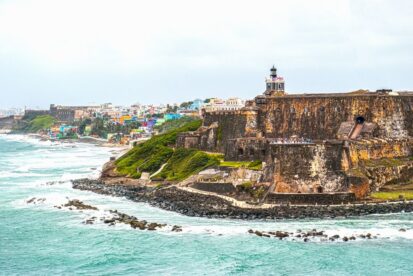

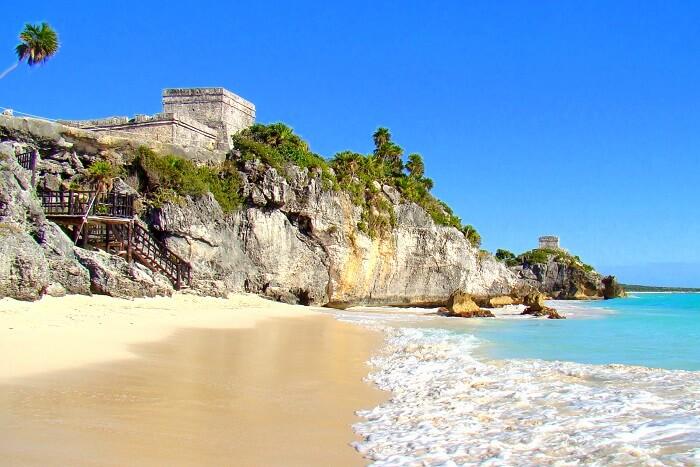
Interested in traveling the world while getting paid? Here at Diversifying Globetrotters LLC, we are partnered with Melanin On The Map and Travel Coach Network to help people across the world find financial, personal, and time freedom. Join the hundreds of others making the change to better themselves while exploring the world and adding money to their pockets.